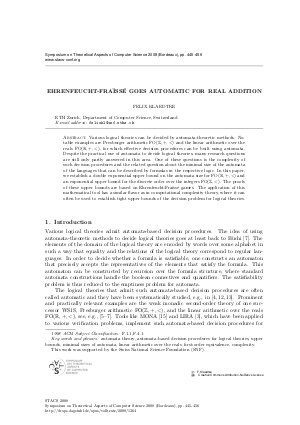Ehrenfeucht-Fraissé Goes Automatic for Real Addition
Author Felix Klaedtke
-
Part of:
Volume:
25th International Symposium on Theoretical Aspects of Computer Science (STACS 2008)
Part of: Series: Leibniz International Proceedings in Informatics (LIPIcs)
Part of: Conference: Symposium on Theoretical Aspects of Computer Science (STACS) - License:
 Creative Commons Attribution-NoDerivs 3.0 Unported license
Creative Commons Attribution-NoDerivs 3.0 Unported license
- Publication Date: 2008-02-06
File

PDF
LIPIcs.STACS.2008.1364.pdf
- Filesize: 190 kB
- 12 pages
Document Identifiers
Subject Classification
Keywords
- Automata theory
- automata-based decision procedures for logical theories
- upper bounds
- minimal sizes of automata
- linear arithmetic over the reals
- f
Metrics
- Access Statistics
-
Total Accesses (updated on a weekly basis)
0Document
0Metadata
Abstract
Various logical theories can be decided by automata-theoretic
methods. Notable examples are Presburger arithmetic FO$(Z,+,<)$
and the linear arithmetic over the reals FO$(R,+,<)$, for which
effective decision procedures can be built using automata. Despite
the practical use of automata to decide logical theories, many
research questions are still only partly answered in this area.
One of these questions is the complexity of such decision
procedures and the related question about the minimal size of the
automata of the languages that can be described by formulas in the
respective logic. In this paper, we establish a double exponential
upper bound on the automata size for FO$(R,+,<)$ and an exponential
upper bound for the discrete order over the integers FO$(Z,<)$.
The proofs of these upper bounds are based on
Ehrenfeucht-Fraiss{'\e} games. The application of this
mathematical tool has a similar flavor as in computational
complexity theory, where it can often be used to establish tight
upper bounds of the decision problem for logical theories.
Cite As Get BibTex
Felix Klaedtke. Ehrenfeucht-Fraissé Goes Automatic for Real Addition. In 25th International Symposium on Theoretical Aspects of Computer Science. Leibniz International Proceedings in Informatics (LIPIcs), Volume 1, pp. 445-456, Schloss Dagstuhl – Leibniz-Zentrum für Informatik (2008)
https://doi.org/10.4230/LIPIcs.STACS.2008.1364
BibTex
@InProceedings{klaedtke:LIPIcs.STACS.2008.1364,
author = {Klaedtke, Felix},
title = {{Ehrenfeucht-Fraiss\'{e} Goes Automatic for Real Addition}},
booktitle = {25th International Symposium on Theoretical Aspects of Computer Science},
pages = {445--456},
series = {Leibniz International Proceedings in Informatics (LIPIcs)},
ISBN = {978-3-939897-06-4},
ISSN = {1868-8969},
year = {2008},
volume = {1},
editor = {Albers, Susanne and Weil, Pascal},
publisher = {Schloss Dagstuhl -- Leibniz-Zentrum f{\"u}r Informatik},
address = {Dagstuhl, Germany},
URL = {https://drops.dagstuhl.de/entities/document/10.4230/LIPIcs.STACS.2008.1364},
URN = {urn:nbn:de:0030-drops-13649},
doi = {10.4230/LIPIcs.STACS.2008.1364},
annote = {Keywords: Automata theory, automata-based decision procedures for logical theories, upper bounds, minimal sizes of automata, linear arithmetic over the reals, f}
}
